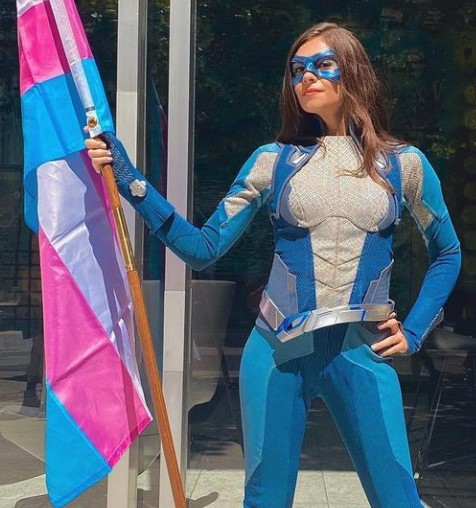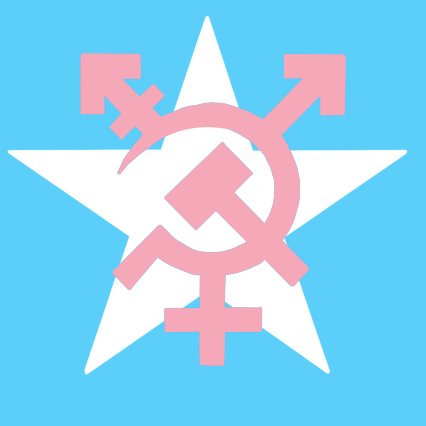A chairdre! It’s time once again to dig into the essay collection Transgender Marxism.
The PDF is here - https://transreads.org/wp-content/uploads/2021/07/2021-07-15_60f0b3d5edcb7_jules-joanne-gleeson-transgender-marxism-1.pdf
The intro discussion, which includes links to all essay discussions, is here - https://lemmygrad.ml/post/395378
Today we’ll be talking about the fifth essay in the collection, A Queer Marxist Transfeminism: Queer and Trans Social Reproduction by Nat Raha.
Nat Raha is a poet based in Edinburgh, who completed a PhD at the University of Sussex entitled ‘Queer Capital: Marxism in queer theory and post-1950 poetics’. Her current research investigates radical transfeminism, and race in UK poetry and poetics. She has performed her work internationally, and is the author of three collections and numerous pamphlets of poetry. Nat is co-editor of the Radical Trans-feminism zine.
As usual, I’ll be pulling quotes and taking notes.
Please, feel free to add your own thoughts, ideas, questions, comments. This is something I’m doing for a discussion group I lead in real life, but I am including my initial read-through and note-taking here as a way to spark a discussion, or share a little bit of knowledge.
At the very least, I hope we can all learn something together, or that someone will find having the PDF helpful <3
(I’m sleepy as heck today, so it’ll be a lot slower than usual, with frequent breaks, but I promise we’ll get through the whole essay)
Edit: the discussion continues with the essay by Virgínia Guitzel here - https://lemmygrad.ml/post/412487


“Wages Due also produced a detailed analysis of the economic and social impact of Section 28 of the UK’s Local Government Act (1988), which banned promoting ‘the acceptability of homosexuality as a pretend family relationship’ in schools”
We are seeing literally the same repressive anti-queer legislation being pushed in the UK today.
Currently, however, there is a sharper concentration of wealth, so while such policies are receiving widespread pushback, they are funded by the very public and vocal wealthy elite (which is a direct contradiction to the spurious notion that queer rights is a bourgeois decadence that somehow manages to persist in certain leftist circles)
“In Barbara Leslett and Johanna Brenner’s often cited definition, social reproduction describes ‘[the] activities and attitudes, behaviours and emotions, responsibilities and relationships directly involved in the maintenance of life on a daily basis’.”
“Marxist feminism conceptualises socially reproductive labour as the work that reproduces both workers as living human entities and their labour power under capitalism.”
Silvia Federici (Wages Against Housework):
“‘To say that we want wages for housework is to expose the fact that housework is already money or capital, that capital has made and makes money out of our cooking, smiling, fucking’.”
(If you can’t tell, even though her analyses rarely ever touched upon queer issues and their relation to the subjugation of women as a labour class in relation to the means of reproduction, I love her writing dearly.)
“Women and feminised workers from the Global South (that is, workers of colour) are often responsible for the social reproduction of people in or from the Global North”
This happens through many ways, either through the vast expropriation of labour in offshored factories, mines, and sweatshops, which requires a massive labour force in the Global South whose reproduction and care is provided by women, or, more directly, through the very common occurrence of women from the Global South being hired on (underpaid if paid at all) as caretakers, nannies, nurses, housekeepers, maids, etc, of families in the Global North.
It’s also important to note that often you’ll see analyses of Marxist (and other intersectional) feminism that speaks of workers of colour as “feminised.” This is because during the transition to capitalism, when colonisers were accumulating wealth through the overwhelming exploitation of Black and Indigenous workers, the gender classes of “man” and “woman” weren’t extended to the exploited peoples as such.
Colonised women were expected to toil in the fields alongside colonised men, and colonised men were expected to cook and clean and provide other forms of reproductive labour alongside the women. In this way, it can be seen that the colonial classes of “man” and “women” were primarily crafted along racial lines of “whiteness” and as such people of colour were inherently feminised workers.
“the theoretical implications of queer positionality within, or more often than not exclusion from, the social factory of capitalist society remain absent. Correcting this would require the recognition of the particular burdens of socially reproductive labour placed upon queer and trans life.”
“Contemporary queer femme and trans cultures have addressed how the reproductive labour necessary for queer and trans communal survival falls disproportionately on certain femme/feminised, trans, poor, disabled people, sex workers, and/or people of colour”
This ties in with our previous discussions of the social reproduction of queer and trans identities themselves. Given a lack of care and access to social programmes, waged labour, and other institutions of cis society, queer people rely heavily on creating community circles of mutual aid.
In Paris is Burning we see the house system: small family units of queer people who support one another not only through their transitions and expression of identity, but directly, through gig jobs, sex work, and “mopping” (shoplifting techniques).
In the queer community, the most marginalised often are the core of unpaid labour amongst the community itself: providing education, emotional support, and caregiving.
“Linking femmephobia, transmisogyny, and sexism more broadly to the lack of respect given to femmes, Piepzna-Samarasinha emphasises that poor, of colour, sick, disabled, parenting, sex worker and/or rural femmes still ‘hold it the fuck down’”
“the only damn way you or anybody survives is by helping each other. No institutions exist to help us survive – we survive because of each other. Your life is maintained by a complex, non-monetary economy of shared, reciprocal care”
“Homonormativity emerges in the wake of neoliberal capitalist structural adjustment, and its transformation of the conditions of socially reproductive labour”
Homonormativity is the state assimilating gay families into the nuclear family model. It is seen as a victory or liberation, but there’s nothing liberatory about it. By folding queer identities into the already-existing capitalist model of a family, it merely allows the perpetuation of unpaid domestic labour and the exploitation of a larger range of people, while simultaneously working to de-radicalise queer people by attempting to convince them that they have achieved equality.
Assimilationist politics cannot achieve liberation, and are always tools of the state to de-fang demands for equitable conditions. The most marginalised are never extended these invitations to normative structures, and are robbed of allies (either straight allies or the newly-assimilated and lesser-marginalised queer allies) in their fights and painted as exaggerative and over-reactive: why continue to fight, the argument goes, when gay marriage has already been legalised?
“It offers specifically a ‘promise’ of ‘a demobilized gay constituency and a privatized, depoliticized gay culture anchored in domesticity and consumption’.”